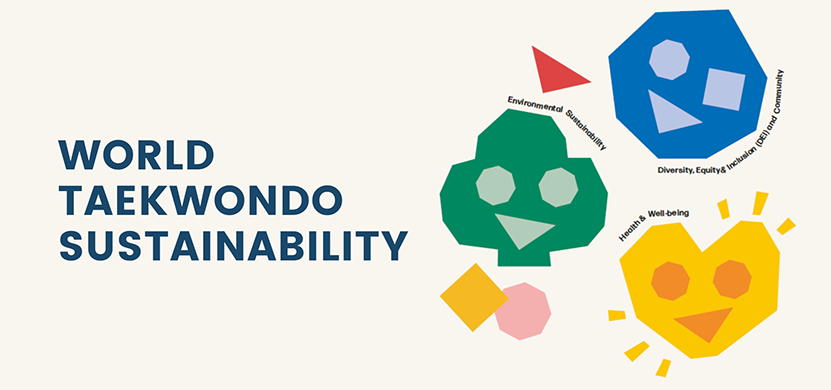- Competitions
-
- - World Taekwondo Championships
- - World Taekwondo Grand-Prix
- - World Para Taekwondo Championships
- - World Taekwondo Cadet Championships
- - World Taekwondo Worldcup Team Championships
- - World Taekwondo Junior Championships
- - World Taekwondo Beach Championships
- - World Taekwondo Poomsae Championships
- - World Taekwondo Grand Slam
- - World Taekwondo Poomsae Open Challenge
- - Olympic Games
- - Paralympic Games
- - Youth Olympic Games
- - Continental Union Championships
- - FISU World University Games
- - Multi Games
- - World Taekwondo Under 21 Championships
- - World Taekwondo Grand Prix Challenge
- - World Taekwondo Women's Open Championships
- - Virtual Taekwondo
- - World Para Taekwondo Grand Prix
- - Hope and Dreams Sports Festival
- - World Para Taekwondo Poomsae Championships
- WT CALENDAR
- PARTNERS & SUPPLIERS
- ABOUT WT
-
- Vision, Mission, Strategy
- Organization
- CUs/MNAs
- Secretariat
- Council
- COMMISSIONS AND Committees
- WT Demo Team
- LOGO & OTHER DESIGNS
World Taekwondo (WT) is the International Federation (IF) governing the sport of Taekwondo and is a member of the Association of Summer Olympic International Federations (ASOIF) and International Paralympic Committee (IPC). WT leads the most inclusive and accessible combat sport, which combines the values of an ancient Asian heritage with the values of a global elite sport.
-
- MULTIMEDIA
- ATHLETES
- COMPETITIONS
-
-

- World Taekwondo
Championships
-

- WORLD TAEKWONDO GRAND-PRIX
-

- WORLD PARA TAEKWONDO CHAMPIONSHIPS
-

- WORLD TAEKWONDO CADET CHAMPIONSHIPS
-

- WORLD TAEKWONDO WORLDCUP TEAM CHAMPIONSHIPS
-

- WORLD TAEKWONDO JUNIOR CHAMPIONSHIPS
-

- WORLD TAEKWONDO BEACH Championships
-

- WORLD TAEKWONDO POOMSAE CHAMPIONSHIPS
-

- WORLD TAEKWONDO GRAND SLAM
-

- WORLD TAEKWONDO POOMSAE
OPEN CHALLENGE
-

- OLYMPIC GAMES
-

- PARALYMPIC GAMES
-

- YOUTH OLYMPIC GAMES
-

- CONTINENTAL UNION CHAMPIONSHIPS
-

- FISU World University Games
-

- MULTI GAMES
-

- World Taekwondo
Under 21 Championships
-

- World Taekwondo
Grand Prix Challenge
-

- World Taekwondo
Women's Open Championships
-

- Virtual Taekwondo
-

- World Para Taekwondo
Grand Prix
-

- Hope and Dreams Sports Festival
-

- World Para Taekwondo Poomsae
Championships
-
-
- NEWS
About WT Sustainability

Definition of Sustainability
Sustainability in Taekwondo isn't just a concept—it's a core value. It reflects our commitment to social and environmental responsibility, ensuring that Taekwondo can be enjoyed by current and future generations while contributing to an inclusive and peaceful society.
Our Approach
World Taekwondo's sustainability efforts are guided by global frameworks like the IOC Olympic Agenda 2020 and 2020+5, the UN 2030 Agenda for Sustainable Development, the UN Sport for Climate Action Framework, and the IUCN Sport for Nature Framework. By adhering to these standards, we aim to set a benchmark for sustainability in sports.
IOC Olympic Agenda 2020 and 2020+5
Sustainability is one of the three pillars in the IOC’s strategic roadmap. The Olympic Agenda 2020+5 builds on this, aiming to foster solidarity and sustainable development in the post-coronavirus world.
UN 2030 Agenda for Sustainable Development
World Taekwondo aligns with the UN’s 17 Sustainable Development Goals (SDGs), focusing on health and well-being, quality education, gender equality, reduced inequalities, and climate action, among others.
United Nations Sport for Climate Action Framework
World Taekwondo is committed to the five principles of this framework, which include mapping GHG emissions and setting goals to halve them by 2030 and achieve net-zero by 2040.
IUCN Sport for Nature Framework
This framework aims to integrate biodiversity and nature conservation into sports practices. World Taekwondo is dedicated to promoting conservation efforts and minimizing our impact on natural environments.
Global Reporting Initiative (GRI)
We follow GRI standards to identify and report on our material topics, ensuring transparency and accountability.



